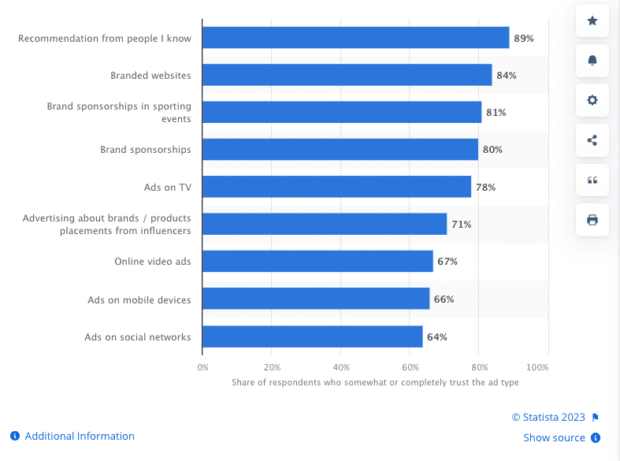If you’re not running an employee advocacy program, you could be missing out on a lot of potential reach.
Why? Your employees are one of your biggest untapped marketing resources — and psst, they’re already on social media. Yup, these influencers and brand ambassadors have been under your nose all along.
Read on to learn everything you need to know about kick-starting your own advocacy program.
Key Takeaways
- Employee advocacy is when employees share their company’s content on their personal social media accounts, amplifying the brand’s reach and credibility.
- Advocacy programs turn employees into brand ambassadors, creating increased visibility, trust, and engagement from new audiences.
- Best practices include building a positive workplace culture, setting clear goals, and rewarding employees for their participation in the advocacy program.
What is employee advocacy?
Employee advocacy is when employees share their company’s content or values on their personal social media accounts to boost brand awareness and build trust.
Advocacy content can include everything from job postings to blog articles to industry resources to new product launches.

However, advocacy can also happen via original social media content.
That’s right: whether employees are re-posting your brand’s content or crafting their own, any social media content that promotes your company can be considered employee advocacy.
Sure, your employees are probably already posting about your workplace or brand without you asking. However, an official advocacy program can help take that organic influence to the next level.
Benefits of employee advocacy
Why is employee advocacy important? Here are three ways programs like these can benefit companies:
- It positively impacts sales due to increased brand awareness and favorable perceptions (“brand sentiment”).
- It improves staff recruitment, retention, and engagement.
- It aids in PR crises and issue management.
Ninety-eight percent of employees are already on social media, which is now a top channel for online brand research (second only to search engines).
Studies show that advocacy from your team can help shorten the sales cycle, attract and develop new business, and build your employer brand. Plus, you can extend your organic reach by 200% and increase profitability by 23%.
Why does employee advocacy work so well? It’s all about trust, which Edelman calls “the ultimate currency.” In fact, fifty-nine percent of consumers will stop buying from a company if they don’t trust the brand.

Eighty-nine percent of consumers trust recommendations from people they know over branded content or traditional ads. Fifty-six percent of millennial and Gen Z consumers trust influencers more than brands.
Hootsuite’s research shows advocacy on social networks is directly related to higher brand health metrics, including positive sentiment, value, and share of voice — especially among mature organizations.
Armanino LLP, for example, used its advocacy program to equip more employees across the business with the skills and tools to become social superstars — and build the firm’s reach and reputation along the way.
The results? Armanino reached 19.2 million (yes, million) people with employee networks. That’s a more than 600% increase in reach and $232,375 in potential ad value created. Not too shabby!
PS: Armanino also used Hootsuite Amplify, our advocacy tool, to help equip their 595 active users with plenty of content to reshare and make their own.
Ready to build your own advocacy program? We’ll walk you through it.
Step 1: Create a positive and engaged workplace culture
It’s simple: Happy employees want to post about their company.
Search for the #sephoralife hashtag, for instance, and you’ll discover photo after photo of smiling Sephora employees.
So how do you create an engaged workplace culture?
Research from Gallup suggests that 70% of employee engagement is determined by the manager. Great culture starts at the top.
Leaders need to clearly define roles and expectations, provide appropriate training and tools, and create evaluation processes that help employees thrive.
And hey, creating a great place to work has many other benefits. Research suggests that businesses with engaged employees show higher profitability (+23%), customer loyalty (+10%), and productivity (+18%).
Step 2: Set goals and KPIs for your advocacy program
Before asking your employees to serve as brand advocates, it’s important to figure out why you’re even asking them.
Example goals could be acquiring more leads, recruiting talent, improving brand awareness, or increasing share of voice on social.
Some key KPIs to track are:
- Top contributors. Which individuals or teams are sharing the most? Which advocates are generating the most engagement?
- Organic reach. How many people see the content shared through your employee advocates? (Psst: try our employee advocacy calculator to calculate your potential reach.)
- Engagement. Are people clicking links, leaving comments, and re-sharing content from your advocates? What is the engagement per network?
- Traffic. How much traffic did the content shared by employee advocates drive to your website?
- Brand sentiment. How has your advocacy campaign impacted your overall brand sentiment on social media?
If you create a company hashtag, be sure to track mentions. Branded hashtags can help employees show off your culture, improve recruitment and brand sentiment, and feel more connected to the company and each other.
Step 3: Identify program leaders
While it may be tempting to pick your executive team as program leaders, the team members who are already social media all-stars are actually your best bet.
Think about:
- Who already has or is building a strong personal brand on social media?
- Who naturally shares industry content or brand messages?
- Who is the public face of your company, either in their role (speaking engagements, PR, etc.) or number of social media connections?
- Who is enthusiastic about your industry and the company?
People like these are a social media manager’s best friend. Empower them to help build your employee advocacy program by defining and communicating campaigns, setting goals, and creating incentives.
Then, work with your advocacy leaders to identify in-house beta testers before launching your program company-wide. They can help guide your employee advocacy strategy and provide honest feedback.
When you launch your advocacy program, you may see an initial flurry of social shares. But without effective internal leadership, this enthusiasm will fizzle out over time. Successful programs use employee advocacy leaders to help ensure advocacy is an ongoing focus.
Step 4: Establish employee social media guidelines
It’s not enough to know what the message is; employees also need to know the best way to communicate it. What kind of language should they use? How often should they post? How should they respond to comments?
To address this, you need two documents:
- Social media content policy. A “do’s and don’ts” of what employees should share, topics to avoid (e.g., politics, etc.), answers they can provide to common questions (FAQ), and more.
- Brand style guidelines. This is the visual guide, including how to use the company logo, unique terms or spelling your company uses (e.g., it’s Hootsuite, not HootSuite!), hashtags to include, and more.
Guidelines, especially content ones, aren’t meant to police your employees. The right guidelines should clearly state what’s off-limits while allowing for authentic expression.
Clear guidelines also help protect your company’s reputation and avoid security risks. Some guidelines are common sense — for instance, avoiding vulgar or disrespectful language or sharing confidential information. Other guidelines may need input from the legal department.
Make sure the guidelines are easy to understand and follow. Include visual examples and recommendations on what, where, and how to share.
(Also include contact information for your advocacy program’s leader so employees know who to ask for additional guidance if needed. Keeping everyone on the same page is key, so internal communication is important here.)
We’ve got a free template for you to create an employee social media policy or check out examples from other companies.
Step 5: Get employees involved in your strategy
Once you have goals and guidelines in place, it’s time to reach out to employees. Let them know about your advocacy program and tools, and then set ‘em loose to start sharing company content!
To encourage participation, involve your employees in content planning. Share your current social media strategy and ask them which types of content would show off the company culture or what would fit in with the goals of your program.
Use the feedback your teams give you to guide your overall marketing strategy. For example, Hootsuite’s content categories in our own tool are company news, product announcements, thought leadership, and recruitment.
Step 6: Create valuable resources for employees to share
The real key to getting your employees to share? Provide them content they need to either make their job easier or help position them as an industry expert.
Research from LinkedIn shows users who share advocacy content receive 600% more profile views and grow their networks three times faster.
Athletico Physical Therapy uses Hootsuite Amplify to expand its reach by coordinating content around key events when they know engagement will be high, like National Physical Therapy Month.
After launching their advocacy program, the Athletico team saw a 39% increase in engagement across all social media channels — not bad!
Pro tip: Curate and maintain a content library of evergreen content resources so employees can find them easily.
Don’t forget about the power of a personal message. Pre-approved content is great for quick shares, but give your employees the freedom to write their own captions for image or video posts, too (as long as they follow your brand guidelines).
Unique content will resonate more with their followers, who know your employees more than they know your brand (for now).
Step 7: Reward employees for their participation
Since you’re asking your employees for something, it’s only fair to offer something in return (beyond increasing their visibility and credibility as thought leaders and subject matter experts).
Tangible incentives like gift cards or prizes can help employees feel like they have a stake in the program.
Gamification is also a great strategy. Many brands make social media advocacy into a game or contest.
For example, create a hashtag to promote a specific advocacy campaign. Then, create a leaderboard and gift a prize to whoever earns the most impressions or engagement for the hashtag.
Other tactics you can apply to sweeten the deal include:
- VIP programs
- Development opportunities
- Early access
- Badges
- Challenges for teams or individuals
Learn more about how to roll out an employee advocacy program with our program guide (below).
Employee advocacy best practices
Only share engaging content
It may sound obvious, but this one is important! If you’re having trouble coming up with ideas, explore our cheat sheet for engaging social media content.
Make it worth your employees’ while
Advocacy content should help your employees build their online image as industry experts. If you can gamify your advocacy program, participation becomes even easier.
Find what motivates your team. Prizes? Contests? Gift cards? Your employees are giving you tons of free organic reach — the least you could do is buy ‘em a coffee card.
Foster a great company culture
Engaging in employee advocacy — and with their role and your company in general — comes from naturally wanting to share and being proud of where they work. Give them good reasons to be proud.
Measure success
An advocacy program should align with your organization’s primary business goals and inform the metrics you should be tracking. Decide how often you’ll measure. Will it be weekly, quarterly, or yearly?
Make sure you set your benchmarks and identify trends and variations from there.
The worksheet provided earlier sets the framework for measuring this program’s success. However, you should also measure its shortcomings. This will give you valuable insights that will improve the program and keep it rolling in the future.
FAQs about employee advocacy
What is an example of employee advocacy?
Employee advocacy happens when a team member shares content about your company, whether online or offline—for example, a social media post about your brand, shared by someone who works for you.
Any time your employee posts positive content about your company or their experience working for you, this is advocacy in action.
Why do we need employee advocacy?
Advocacy programs benefit companies by positively impacting sales due to increased brand awareness and favorable perceptions (“brand sentiment”). It also improves staff recruitment, retention, and engagement and can aid in PR crises and issues management.
Hootsuite Amplify — your employee advocacy platform
The hardest part of employee advocacy is often the execution. Where will they find content to share? Where can they review your social media and brand guideline documents? How will they find out about new content? How can you streamline employee communication about new initiatives?
You can go as basic as having everyone sign up for the company newsletter to find content to share on their own, or… Use employee advocacy software to distribute approved content, easily share to their profiles with one click, and seamlessly measure the ROI and results.
Hootsuite Amplify is your all-in-one solution for setting up an advocacy program people want to be part of. Check out how it works in under two minutes:
If you already use Hootsuite for social media planning, it’s as easy as adding the Amplify app to your account (for Business and Enterprise customers). Boom, done!
Having a central hub that employees can visit to stay informed and easily share pre-approved content from pays off. At Hootsuite, we have a 94% adoption rate and a 64% share rate. Our program earns over 4.1 million organic impressions per quarter!
Plus, Amplify analytics reports allow you to track program growth and content performance metrics—and measure its ROI along with all your other social media metrics in your Hootsuite account.
Tap into the power of employee advocacy with Hootsuite Amplify. Increase brand reach, keep employees engaged, and measure results—safely and securely. Learn how Amplify can help grow your organization today.







